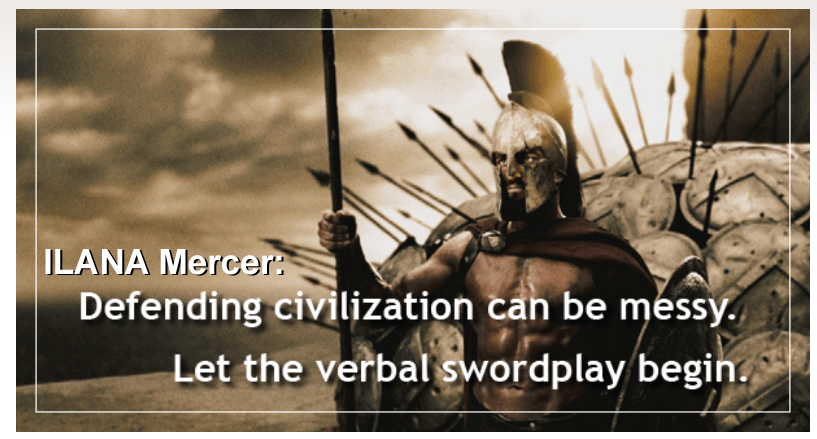There was a lot that was bad about the Spartans, and a great deal that was good about them. Their women were liberated. They were not decadent like the Athenians, whom Leonidas calls ‘boy-lovers.’ That they were as brave as can be at Thermopylae, and that their courage contributed to the continuance of Western civilization—this cannot be denied ~ilana
The Spartans who fought at Thermopylae were Greek heroes and ours as well—but heroism is passé and blood makes the commentariat squeamish.
The film “300” is based on a comic-book rendition of the epic Battle of Thermopylae (480 BC), in which 7,000 Greeks confronted over 260,000 Persians, intent on invading and enslaving the Greek city-states. The Spartans, under King Leonidas’ command, held the front until their Athenian compatriots were able to mount a sea offensive, eventually defeating the Persian King Xerxes, and stopping his expansion into Europe.
The ferocious Greek infantrymen lodged themselves in the eponymous pass, the Hot Gates, successfully—and brilliantly—fighting off waves of Persians. Then they were betrayed. A Greek traitor, Epialtes, guided the Persians through a backdoor mountain path to outflank Leonidas’ force. Leonidas let the rest of the army retreat, but retained 300 elite-force Spartans and some Thebans and Thespians to fight Xerxes till the end.
Personally, I found the kabuki-like quality of the film quite beautiful, but overall, most reviewers, left and right, complained bitterly about “excessive violence.” Now a reviewer might legitimately abjure the genre’s stylistic excesses. But only a modern-day effete would kvetch about excessive gore in such a battle. A few hundred men plant themselves in a narrow pass, as the Barbarian hordes smash against their shields—and reviewers complain of “excessive violence”?
Among the commentariat, smarmy has replaced smart. Everyone strains to produce clever repartee. Few manage. Most end up sounding fussy (read gay) and foolish. Thus Rolling Stone effused about the Spartan’s “gym-ready,” “crotch-squeezing ensembles that expose as much flesh as an R rating will allow.” To the campy reviewer, the 300 were gladiators in gay get-up. Or “quite the beefcake movie,” in the Los Angeles Times’ parlance. Today’s metrosexuals malign manliness. To the hip, heroism is “so yesterday.”
Pop psychology’s twisted constructs are yet another implement by which the intellectually impotent rape reality. The same reviewer described spears and swords as “handy phallic symbols.” Sometimes a sword is just a sword. Were the Hellenes wishing secretly that they were brandishing sex toys instead of swords against the Persian Immortals? I doubt it. So why the psychosexual babble?
300’s cartoonish accoutrements—the screenplay writer unleashes a menagerie of beasts and beast-like men—were taken by many reviewers as proof of the flick’s flimsy historical foundation. Historically, however, 300’s blow-by-blow depiction of the battle hews rather closely to Herodotus’ Histories.
Complaints abounded about the “laughable” dialogue. But once one reads Herodotus, Book VII to be precise, the lines in “300” do not seem so fantastic. For example, when the Persians warned the Spartans that their arrows would soon blot out the sunlight, the Spartan Dienekes did indeed quip, “Then we will fight in the shade.” When the enemy demanded the Spartans lay down their weapons; Leonidas roared, “Come and take them.” Verbal swordplay was clearly part of Spartan character.
The 300 and their brothers-in-arms were not only Greek heroes, but ours as well. Yet the most absurd—and obscure—argument against this proposition contended that the Spartans could not have been fighting for individual liberties, since they themselves were part of a militaristic, collectivist, statist society. The Spartans fought so that their women and children would not be enslaved and they not slaughtered by the Persians. The right not to be slaughtered and the right not to be enslaved—what, pray tell, are they, if not the ultimate individual rights? To claim members of a flawed society cannot fight for individual liberties is a non sequitur.
Although slavery was prevalent throughout Greece, others felt that the Spartans’ cruelty to the Messenians, a people they occupied and turned into helots or serfs, somehow nullified their bravery and the significance of the Battle of Thermopylae. As this illogic has it, and for the defensive war they waged to be deemed righteous, the Spartans circa 480 BC would have had to adhere to the American Bill of Rights.
There was a lot that was bad about the Spartans, and a great deal that was good about them. Their women were liberated. They were not decadent like the Athenians, whom Leonidas calls “boy-lovers.” That they were as brave as can be at Thermopylae, and that their courage contributed to the continuance of Western civilization—this cannot be denied. Indeed, reviewers, for the most, neglected the sweep of history.
By repelling Eastern despotism, the Greeks, first at Thermopylae, then in the battles of Salamis (480 BC) and Plataea (479 BC), saved Western Civilization.
©2007 By ILANA MERCER
WorldNetDaily.com (March 16)
The Ottawa Citizen (March 21)
The Orange Country Register (March 25)
CATEGORIES: Ancient History, Film, History, Liberty, Middle East, Military, War, Western Civilization

 print
print